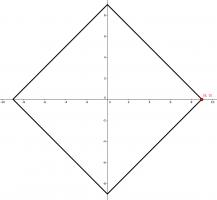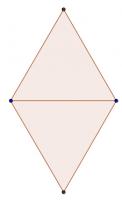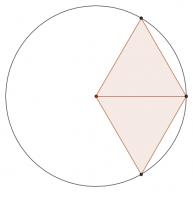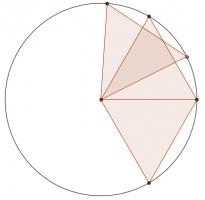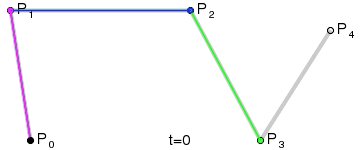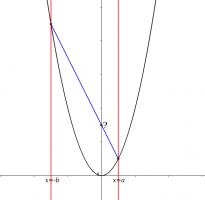Puzzles
1 December
One of the vertices of a rectangle is at the point \((9, 0)\). The \(x\)-axis and \(y\)-axis are both lines of symmetry of the rectangle.
What is the area of the rectangle?
Show answer
Hide answer
The only way this is possible is if the rectangle is this square:
The area of this square is 162.
6 December
\(p(x)\) is a quadratic with real coefficients. For all real numbers \(x\),
$$x^2+4x+14\leq p(x)\leq 2x^2+8x+18$$
\(p(2)=34\). What is \(p(6)\)?
Between quadratics
\(p(x)\) is a quadratic polynomial with real coefficients. For all real numbers \(x\),
$$x^2-2x+2\leq p(x)\leq 2x^2-4x+3$$
\(p(11)=181\). Find \(p(16)\).
Show answer
Hide answer
$$x^2-2x+2=(x-1)^2+1$$
$$2x^2-4x+3=2(x-1)^2+1$$
Therefore the minimum point of both of these quadratics is \((1,1)\). \(p(x)\) will only be between these if:
$$p(x)=a(x-1)^2+1\quad\text{where }1\leq a\leq 2$$
We know that \(p(11)=181\), so:
$$\begin{array}{rl}
181&=p(11)\\
&=a(11-1)^2+1\\
&=100a+1
\end{array}$$
Therefore \(a=1.8\). This means that:
$$\begin{array}{rl}
p(16)&=1.8(16-1)^2+1\\
&=1.8\times225+1\\
&=406
\end{array}$$
Balanced sets
A set of points in the plane is called 'balanced' if for any two points \(A\) and \(B\) in the set, there is another point \(C\) in the set such that \(AC=BC\) (here \(AC\) is the distance between \(A\) and \(C\)).
For all \(n\geq3\), find a balanced set of \(n\) points.
Show answer
Hide answer
If \(n\) is odd, the vertices of a regular \(n\)-gon are balanced.
If \(n\) is even, a balanced set can be constructed as follows:
If \(n=4\), this set is balanced (both the triangles are equilateral):
Draw a triangle with its centre at one of the points, going through the other three points:
For \(n>4\), repeatedly add a two new points on the circle which form an equilateral triangle with the centre. For example, for \(n=6\), this set is balanced:
And for \(n=8\), this set is balanced:
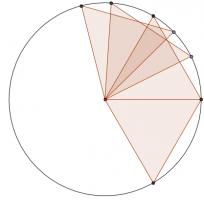
Bézier curve
1) A set of points \(P_0\), ..., \(P_n\) are chosen (in the example \(n=4\)).
2) A set of points \(Q_0\), ..., \(Q_{n-1}\) are defined by \(Q_i=t P_{i+1}+(1-t) P_i\) (shown in green).
3) A set of points \(R_0\), ..., \(R_{n-2}\) are defined by \(R_i=t Q_{i+1}+(1-t) Q_i\) (shown in blue).
.
.
.
\(n\)) After repeating the process \(n\) times, there will be one point. The Bézier curve is the path traced by this point at \(t\) varies between 0 and 1.
What is the Cartesian equation of the curve formed when:
$$P_0=\left(0,1\right)$$
$$P_1=\left(0,0\right)$$
$$P_2=\left(1,0\right)$$
Show answer & extension
Hide answer & extension
If
$$P_0=\left(0,1\right)$$
$$P_1=\left(0,0\right)$$
$$P_2=\left(1,0\right)$$
then
$$Q_0=t\left(0,0\right)+(1-t)\left(0,1\right)=\left(0,1-t\right)$$
$$Q_1=t\left(1,0\right)+(1-t)\left(0,0\right)=\left(t,0\right)$$
and so
$$R_0=t\left(t,0\right)+(1-t)\left(0,1-t\right)=\left(t^2,(1-t)^2\right)$$
which means that
$$x=t^2$$$$y=(1-t)^2$$
or
$$y=(1-\sqrt{x})^2$$
Extension
What should \(P_0\), \(P_1\) and \(P_2\) be to get a curve with Cartesian equation
$$y=(1-\sqrt{2x})^2$$
Parabola
On a graph of \(y=x^2\), two lines are drawn at \(x=a\) and \(x=-b\) (for \(a,b>0\). The points where these lines intersect the parabola are connected.
What is the y-coordinate of the point where this line intersects the y-axis?
Show answer & extension
Hide answer & extension
The co-ordinates of the points where the lines intersect the parabola are \((a,a^2)\) and \((-b,b^2)\). Hence the gradient of the line between them is:
$$\frac{a^2-b^2}{a-(-b)}=\frac{(a+b)(a-b)}{a+b}=a-b$$
Therefore the y-coordinate is:
$$b^2 + b(a-b) = ba$$
Ferdinand Möbius, who discovered this property called the curve a Multiplicationsmaschine or 'multiplication machine' as it could be used to perform multiplication.
Extension
How could you use the graph of \(y=x^2\) to divide 100 by 7?
Two lines
Let A and B be two straight lines such that the gradient of A is the y-intercept of B and the y-intercept of A is the gradient of B (the gradient and y-intercept of A are not the same). What are the co-ordinates of the point where the lines meet?
Show answer & extension
Hide answer & extension
Let A have the equation \(y = mx + c\). B will have the equation \(y = cx + m\).
Therefore, \(mx + c = cx + m\).
Which rearranges to \(x(m - c) = m - c.\)
So \(x = 1\).
Substituting back in, we find \(y=m+c\).
The co-ordinates of the point of intersection are \((1,m+c)\).
Extension
Let \(a\), \(b\) and \(c\) be three distinct numbers. What can you say about the points of intersection of the parabolas:
$$y = ax^2 + bx + c\mathrm{,}\\
y = bx^2 + cx + a\mathrm{,}\\
\mathrm{and\ }y = cx^2 + ax + b$$


